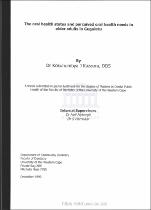| dc.description.abstract | Objectives: previous studies have indicated that most of the older adult population has poor oral health but only a few of them demand care for their problems' The reason for this discrepancy has never been explained adequately. The objectives of the study were' first' to
assess the perceived oral health needs (with regards to social, functional and psychological impacts of oral diseases) of older adults aged 55 years and above, second, to assess the oral hearth status (periodontal disease, dental caries and oral mucosa lesions) in an adult population
aged 55 years and above. Third, compare the relationship between normative and perceived need. Methods: This was a quantitative cross-sectional, descriptive study and consisted of 100 older adults who were randomly selected from three areas in Guguletu' These areas included the home for the aged Ekumphumleni' NY1 and NY2 clinics Participants aged 55 were interviewed using the structured questionnaire consists of 32 questions and clinical examination done. Frequency tables were computed and analyzed. The relationship between variables like oral health status, perceived and variety of socio-demographic variables and measures of psych-social impact of oral diseases were analysed by using the chi square test and square ratio. Results : The ability to perceive that they had a problem and the recently of the last visit to the dentist was associated with perceived need for dental care. There was a significant relationship between the presence of symptoms which were painful and perceived need for dental care mouth,p value:0.015;gums,pvalue=0.001;teeth,pvalue=0.0006)The positive attitude towards dental care and regular dental hygiene was an indicator of positive attitudes towards oral hearth care. In this study a substantial difference between perceived and normative need was also observed' 88% of the respondents perceived a need for dental care and 99% were assessed as needing treatment (normative need) but only z9o/o demanded the c,oe' 630% were dissatisfied with their functional ability to chew and expressed a need for dentures' conclusion: The aim of this study was to assess the oral health status and perceived oral health needs among older adults in Guguletu. The oral health status was poor in most were interviewed using a structured questionnaire consisting of 32question was examination done. Frequency tables were computed and analysed' The relationship between variables participants and the demand for care was lolv even though perceived need was high' The study has shown that social, functional and psychological factors influenced for care in this adult population. The cost for dentalcare and access to these services are major barriers to the demand of care perceived oral hearth needs and the impact of oral diseases are important influences in the assessment of oral health needs in the elderly' The assessment of oral health needs as perceived by the elderly facilitates the planning and implementation dental services with special consideration on the cost and accessibitity of oral healthcare. | en_US |

